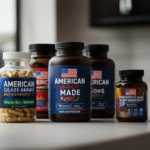Support our educational content for free when you purchase through links on our site. Learn more
Which Vitamin Is Most Important for Your Body? Top 9 Revealed! 🥇 (2025)

Ever wondered which vitamin truly rules your body’s health kingdom? You’re not alone! While many articles stop at the “top 3,” we’re diving deeper with 9 essential vitamins that your body can’t live without—and revealing which one takes the ultimate crown. Spoiler alert: it’s not just about popping a pill; it’s about balance, synergy, and knowing your unique needs.
Did you know that over 40% of adults worldwide are deficient in vitamin D? That’s a staggering statistic that explains why this “sunshine vitamin” often steals the spotlight. But what about the B vitamins, vitamin C, or the lesser-known vitamin K? Stick around as we unravel the science, bust myths, and share real stories—like Sarah’s vitamin D wake-up call—that will change how you think about nutrition forever.
Key Takeaways
- Vitamin D ranks as the most important vitamin for bone health, immune support, and mood regulation, especially given widespread deficiency.
- The B-complex vitamins, vitamin C, A, E, and K each play unique, vital roles in energy, immunity, and cellular repair.
- Vitamins work best in synergy, so a balanced diet plus targeted supplementation is the winning combo.
- Watch for deficiency signs like fatigue, brittle nails, or frequent infections—they’re your body’s SOS signals.
- Quality matters: choose third-party tested supplements from trusted brands like Garden of Life, NOW Foods, and Thorne Research.
- Lifestyle factors like age, diet, sun exposure, and activity level dramatically influence your vitamin needs.
Ready to take control of your health? Explore our curated collections for Essential Vitamins and Multivitamin Supplements to find your perfect match!
Table of Contents
- Quick Tips and Facts About Essential Vitamins ✅
- The Vital Role of Vitamins: A Deep Dive into Body’s Nutritional Needs 🧬
- 1. Which Vitamin Is Most Important for the Body? The Ultimate Ranking 🥇
- 2. Top 7 Essential Vitamins and Their Unique Benefits 🌟
- 3. How Vitamins Work Together: Synergy and Balance in Nutrition ⚖️
- 4. Signs You Might Be Deficient: When Your Body Cries Out for Vitamins 🚨
- 5. Best Food Sources for Each Vital Vitamin: Eat Your Way to Health 🥦🍊
- 6. Vitamin Supplements: When to Use Them and How to Choose Wisely 💊
- 7. Debunking Myths: What You Didn’t Know About Vitamin Importance 🕵️♂️
- 8. Vitamins and Your Immune System: The Dynamic Duo for Wellness 🛡️
- 9. How Lifestyle Affects Vitamin Needs: Age, Activity, and More 🏃♀️🧓
- Conclusion: Your Personalized Vitamin Power Plan 🎯
- Recommended Links for Further Vitamin Wisdom 📚
- FAQ: Your Burning Questions About Vitamins Answered 🔥
- Reference Links: Trusted Sources Behind Our Vitamin Insights 🔗
Quick Tips and Facts About Essential Vitamins ✅
Welcome to the vitamin jungle! 🌿 Before we embark on the epic quest to crown the most important vitamin for your body, let’s arm you with some quick, bite-sized facts that every vitamin enthusiast should know:
- There are 13 essential vitamins your body needs daily, including A, C, D, E, K, and the B-complex family. (Curious how to get all 13? Check out our detailed guide: How Do You Get All 13 Essential Vitamins? Your 2025 Guide! 🥦)
- Vitamins are classified as fat-soluble (A, D, E, K) and water-soluble (B-complex and C), which affects how your body stores or excretes them.
- Deficiency symptoms can be sneaky: fatigue, brittle nails, poor immunity, or even mood swings. Don’t ignore these red flags! 🚩
- Your diet, lifestyle, age, and health conditions dramatically influence your vitamin needs. No one-size-fits-all here!
- Overdosing on vitamins, especially fat-soluble ones, can be harmful. Balance is key. ⚖️
Fun fact: Vitamin D is nicknamed the “sunshine vitamin” because your skin makes it when exposed to sunlight. But with indoor lifestyles, supplements have become a hero for many.
Ready to dive deeper? Let’s unravel the mystery of which vitamin truly wears the crown! 👑
The Vital Role of Vitamins: A Deep Dive into Body’s Nutritional Needs 🧬
Vitamins are like the spark plugs in your body’s engine—tiny but vital for firing up essential processes. Without them, your body’s complex machinery slows down or breaks. Here’s why they matter:
What Do Vitamins Actually Do?
- Support immune function: Vitamins A, C, D, and E are key players in defending against infections.
- Energy production: B vitamins act as coenzymes helping your body convert food into fuel.
- Bone and tissue health: Vitamin D and K help maintain strong bones and proper blood clotting.
- Antioxidant protection: Vitamins C and E neutralize harmful free radicals that damage cells.
- Cell growth and repair: Vitamin A and folate (B9) are crucial for skin, vision, and DNA synthesis.
Why Your Body Can’t Make Them All
Unlike some animals, humans can’t synthesize most vitamins, so diet and supplements are your only sources. This makes understanding which vitamins are most important a health superpower.
The Interplay of Vitamins and Minerals
Vitamins don’t work alone—they team up with minerals like calcium, iron, and magnesium to keep you thriving. For example, vitamin C enhances iron absorption, while vitamin D boosts calcium uptake.
For a comprehensive look at essential vitamins and minerals, check out this excellent overview from MyGNP.
1. Which Vitamin Is Most Important for the Body? The Ultimate Ranking 🥇
Ah, the million-dollar question! If we had to pick one vitamin that’s the MVP for your body, Vitamin D often takes the spotlight. But don’t rush to conclusions—let’s break down the contenders and why Vitamin D usually wins the crown.
| Vitamin | Importance Score (1-10) | Key Benefits | Deficiency Risks | Common Sources |
|---|---|---|---|---|
| Vitamin D | 10 | Bone health, immune support, mood | Rickets, osteoporosis, infections | Sunlight, fatty fish, fortified milk |
| Vitamin B12 | 9 | Nerve function, DNA synthesis | Anemia, nerve damage | Meat, dairy, fortified cereals |
| Iron (Mineral) | 9 | Oxygen transport, energy | Anemia, fatigue | Red meat, legumes, spinach |
| Vitamin C | 8 | Immunity, antioxidant, collagen | Scurvy, poor wound healing | Citrus fruits, peppers, broccoli |
| Vitamin A | 7 | Vision, immune function | Night blindness, infections | Liver, carrots, leafy greens |
| Vitamin K | 7 | Blood clotting, bone metabolism | Bleeding, weak bones | Leafy greens, broccoli, soybeans |
Why Vitamin D?
- It’s involved in over 1,000 genes affecting your health.
- Supports calcium absorption, crucial for strong bones and teeth.
- Modulates your immune system, reducing risk of infections and chronic diseases.
- Linked to mood regulation—hello, sunshine vitamin for winter blues!
But here’s the kicker: many people are deficient due to limited sun exposure, making supplementation a smart move.
Vitamin B12 and Iron: Close Runners-Up
Vitamin B12 is essential for nerve and blood health, especially for vegetarians and older adults who may struggle with absorption. Iron is the oxygen carrier in your blood—without it, your energy tanks fast.
Want to explore more about these vitamins? Visit our Essential Vitamins category.
2. Top 7 Essential Vitamins and Their Unique Benefits 🌟
Let’s zoom in on the seven vitamins that pack the biggest punch for your health, with a quick snapshot of what makes each one shine.
| Vitamin | Unique Benefits | Best Food Sources | Supplement Brands to Consider |
|---|---|---|---|
| Vitamin A | Vision, skin health, immune defense | Carrots, sweet potatoes, liver | NOW Foods Vitamin A, Garden of Life |
| Vitamin B Complex | Energy metabolism, brain function, red blood cells | Meat, eggs, whole grains, legumes | Nature’s Bounty B-Complex, Solgar B-Complex |
| Vitamin C | Antioxidant, immune booster, collagen production | Citrus fruits, bell peppers, strawberries | Emergen-C, Nature Made Vitamin C |
| Vitamin D | Bone strength, immune regulation | Sunlight, fatty fish, fortified dairy | Nordic Naturals Vitamin D3, Thorne Vitamin D |
| Vitamin E | Antioxidant, skin protection, immune support | Nuts, seeds, spinach, avocado | Solgar Vitamin E, NOW Foods Vitamin E |
| Vitamin K | Blood clotting, bone metabolism | Kale, spinach, broccoli | NOW Foods Vitamin K-2, Jarrow Formulas |
| Folate (B9) | DNA synthesis, pregnancy health | Leafy greens, legumes, fortified cereals | Garden of Life Folate, Nature’s Way Folate |
Pro Tip: Multivitamins Can Help Cover Gaps
If your diet isn’t perfect (and whose is?), a high-quality multivitamin like Garden of Life mykind Organics can fill in the blanks.
3. How Vitamins Work Together: Synergy and Balance in Nutrition ⚖️
Think of vitamins as a well-rehearsed orchestra—each instrument (vitamin) plays a unique part, but the harmony is what creates the beautiful symphony of health.
Examples of Vitamin Synergy
- Vitamin D and Calcium: Vitamin D enhances calcium absorption, crucial for bone health. Without enough D, calcium supplements might be wasted.
- Vitamin C and Iron: Vitamin C boosts absorption of non-heme iron (from plants), helping prevent anemia.
- B Vitamins: These often work together to support energy metabolism and nervous system health.
Beware of Imbalances
- Excess vitamin E can interfere with vitamin K’s blood clotting role.
- High doses of some vitamins might compete for absorption or cause toxicity.
How to Achieve Balance
- Prioritize a varied diet rich in fruits, veggies, whole grains, and lean proteins.
- Use supplements thoughtfully, ideally under professional guidance.
- Regularly check blood levels if you have health conditions or dietary restrictions.
For more on supplement safety and synergy, explore our Health Supplements category.
4. Signs You Might Be Deficient: When Your Body Cries Out for Vitamins 🚨
Your body is a master communicator, sending subtle (and sometimes not-so-subtle) signals when vitamin levels dip too low. Here’s what to watch for:
| Symptom | Possible Vitamin Deficiency | What to Do Next |
|---|---|---|
| Fatigue, weakness | B12, Iron, D | Get blood tests, consider supplements |
| Frequent infections | Vitamin C, D, A | Boost immune-supporting vitamins |
| Dry skin, brittle nails | Vitamin A, E, Biotin (B7) | Improve diet, topical care, supplements |
| Poor wound healing | Vitamin C | Increase vitamin C intake |
| Bone pain or fractures | Vitamin D, Calcium | Bone density test, supplement as needed |
| Easy bruising, bleeding gums | Vitamin K, C | Consult healthcare provider |
| Numbness, tingling | Vitamin B12 | Medical evaluation, B12 injections if needed |
Personal Story: Sarah’s Vitamin D Wake-Up Call
Sarah, a 38-year-old office worker, struggled with fatigue and frequent colds. After a blood test, she discovered a severe vitamin D deficiency. With daily supplementation and more outdoor walks, her energy and immunity bounced back dramatically within months! 🌞
If you suspect deficiency, don’t guess—get tested and tailor your vitamin plan accordingly.
5. Best Food Sources for Each Vital Vitamin: Eat Your Way to Health 🥦🍊
Food is your first line of defense and the best source of vitamins. Here’s a handy table to guide your grocery list:
| Vitamin | Top Food Sources | Tips for Maximizing Absorption |
|---|---|---|
| Vitamin A | Carrots, sweet potatoes, spinach, liver | Eat with a little fat for better absorption |
| Vitamin B12 | Meat, fish, dairy, eggs, fortified cereals | Vegetarians should consider fortified foods or supplements |
| Vitamin C | Oranges, strawberries, bell peppers, broccoli | Best absorbed from fresh fruits and veggies |
| Vitamin D | Fatty fish (salmon, mackerel), egg yolks, fortified milk | Sun exposure enhances production |
| Vitamin E | Almonds, sunflower seeds, spinach, avocado | Pair with healthy fats for absorption |
| Vitamin K | Kale, spinach, broccoli, fermented foods | Consistent intake supports blood clotting |
| Folate (B9) | Leafy greens, beans, lentils, fortified grains | Cooking can reduce folate; eat some raw |
Cooking Tips
- Steaming veggies preserves more vitamins than boiling.
- Pair iron-rich plant foods with vitamin C-rich foods to boost absorption.
- Avoid overcooking to keep vitamins intact.
Eating a colorful plate is a simple way to ensure a broad vitamin intake. Think of it as painting your health masterpiece! 🎨
6. Vitamin Supplements: When to Use Them and How to Choose Wisely 💊
Supplements can be a lifesaver, but only if used right. Here’s how to navigate the crowded vitamin aisle like a pro:
When Supplements Make Sense
- Diagnosed deficiencies (e.g., low B12, D, or iron).
- Dietary restrictions (vegan, vegetarian, allergies).
- Increased needs (pregnancy, aging, intense physical activity).
- Limited sun exposure (for vitamin D).
How to Choose Quality Supplements
| Factor | What to Look For | Why It Matters |
|---|---|---|
| Third-party testing | USP, NSF, or ConsumerLab seals | Ensures purity and potency |
| Bioavailability | Forms like methylcobalamin (B12), D3 (vitamin D) | Better absorption and effectiveness |
| Dosage | Meets but does not exceed recommended daily intake | Avoids toxicity |
| Brand reputation | Established brands with transparent sourcing | Trustworthy quality and customer service |
Top Recommended Brands
- Garden of Life: Organic, whole-food based vitamins.
- NOW Foods: Affordable, widely tested supplements.
- Thorne Research: High-quality, clinically backed formulas.
- Nature’s Bounty: Popular and accessible multivitamins.
Real User Insight
Jessica, a busy mom, shared: “Switching to a methylated B-complex from NOW Foods helped my energy levels skyrocket. I finally feel like myself again!”
Explore our curated Health Supplements collection for trusted options.
7. Debunking Myths: What You Didn’t Know About Vitamin Importance 🕵️♂️
Let’s bust some common vitamin myths that might be holding you back from optimal health:
-
Myth #1: More vitamins = better health. ❌
Overdosing can cause toxicity, especially with fat-soluble vitamins like A and E. Balance is key! -
Myth #2: You can get all vitamins from diet alone. ✅ and ❌
While ideal, modern diets and lifestyles often fall short, especially for vitamin D and B12. Supplements can fill gaps. -
Myth #3: All multivitamins are created equal. ❌
Quality varies widely. Look for third-party tested brands and appropriate dosages. -
Myth #4: Vitamin C prevents colds completely. ❌
It supports immune function but isn’t a magic shield. Regular intake may reduce severity and duration. -
Myth #5: Only old people need vitamin supplements. ❌
Deficiencies can affect any age group, especially with restrictive diets or health conditions.
For more myth-busting and facts, visit our Essential Vitamins blog.
8. Vitamins and Your Immune System: The Dynamic Duo for Wellness 🛡️
In today’s world, a robust immune system is your best defense. Vitamins are frontline warriors in this battle.
Key Immune-Boosting Vitamins
- Vitamin C: Enhances white blood cell function and antioxidant protection.
- Vitamin D: Modulates immune responses and reduces inflammation.
- Vitamin A: Maintains mucosal barriers and supports immune cell function.
- Vitamin E: Protects immune cells from oxidative damage.
- Zinc (Mineral): Supports immune cell development and communication.
How Vitamins Help Fight Infection
They support the production and activity of immune cells, improve the skin and mucous membrane barriers, and reduce oxidative stress that can impair immunity.
Real-World Impact
Studies suggest adequate vitamin D levels may reduce the risk of respiratory infections and even severe COVID-19 outcomes (source: NIH).
Boost Your Immunity Daily
- Eat a balanced diet rich in colorful fruits and veggies.
- Get moderate sun exposure for vitamin D.
- Consider supplements if you’re at risk of deficiency.
Explore our Best Vitamins for Men and Best Vitamins for Women for tailored immune support.
9. How Lifestyle Affects Vitamin Needs: Age, Activity, and More 🏃♀️🧓
Your vitamin needs aren’t static—they evolve with your lifestyle. Let’s unpack how:
Age Matters
- Children & Teens: Need vitamins for growth and development, especially vitamin D, calcium, and B vitamins.
- Adults: Focus on maintaining energy, bone health, and immune function.
- Seniors: Absorption decreases, especially B12 and D; supplementation often necessary.
Activity Level
- Athletes: Higher needs for B vitamins, vitamin C, and antioxidants to support energy and recovery.
- Sedentary individuals: May need less but still require balanced intake to prevent deficiencies.
Special Conditions
- Pregnancy: Increased folate, iron, and vitamin D needs.
- Vegetarian/Vegan diets: Higher risk of B12, iron, and vitamin D deficiencies.
- Chronic illnesses: May affect absorption and increase requirements.
Environmental Factors
- Living in northern latitudes or using sunscreen reduces vitamin D synthesis.
- Stress and pollution increase oxidative stress, raising antioxidant vitamin needs.
Pro tip: Regular check-ups and blood tests can help tailor your vitamin intake to your unique lifestyle.
Conclusion: Your Personalized Vitamin Power Plan 🎯

Phew! We’ve journeyed through the vibrant world of vitamins, uncovering the most important players your body needs to thrive. If you take one thing away, let it be this: Vitamin D stands tall as the superstar, thanks to its multifaceted roles in bone health, immune support, and mood regulation. But—and this is a big but—your health is a symphony, not a solo. The B vitamins, vitamin C, A, K, and essential minerals like iron and zinc all play indispensable roles, and their balance is what keeps you feeling your best.
Remember Sarah’s story? Her vitamin D boost transformed her energy and immunity. That’s the power of personalized nutrition. Whether you’re a sun-deprived office warrior, a vegan athlete, or a busy parent, your vitamin needs are unique. Testing, mindful diet choices, and quality supplements from trusted brands like Garden of Life, NOW Foods, and Thorne Research can help you fill nutritional gaps safely.
So, what’s our confident recommendation? Start with a balanced, colorful diet, get moderate sun exposure, and consider a high-quality multivitamin tailored to your lifestyle. If you suspect deficiencies, get tested and supplement accordingly. Avoid mega-dosing without guidance—more isn’t always better!
Your vitamin journey is ongoing, and staying informed is your best defense. Keep exploring, experimenting, and nourishing your body with the essentials it craves. 🌟
Recommended Links for Further Vitamin Wisdom 📚
Ready to power up your vitamin game? Here are some top picks to explore and shop:
-
Garden of Life mykind Organics Multivitamin:
Amazon | Walmart | Garden of Life Official Website -
NOW Foods Vitamin D3:
Amazon | Walmart | NOW Foods Official Website -
Thorne Research Vitamin B Complex:
Amazon | Thorne Official Website -
Nature’s Bounty Vitamin C:
Amazon | Walmart | Nature’s Bounty Official Website -
Books to Deepen Your Vitamin Knowledge:
FAQ: Your Burning Questions About Vitamins Answered 🔥

What are the essential vitamins for overall health and wellness?
Essential vitamins include A, C, D, E, K, and the B-complex vitamins (B1, B2, B3, B5, B6, B7, B9, B12). Each plays a unique role—from supporting vision and immune function (A and C), to bone health (D and K), to energy metabolism and nervous system support (B vitamins). These vitamins cannot be synthesized in sufficient amounts by your body, so you must obtain them through diet or supplements. For a detailed breakdown, visit our Essential Vitamins category.
Read more about “What Is the Number 1 Supplement in the World? Top 10 Revealed (2025) 🌟”
How do I choose the best vitamin supplement for my specific needs?
Choosing the right supplement depends on your age, diet, health status, and lifestyle. Start by identifying any deficiencies through blood tests or symptoms. Look for supplements that:
- Are third-party tested (USP, NSF, ConsumerLab).
- Contain bioavailable forms (e.g., methylcobalamin for B12, D3 for vitamin D).
- Have dosages aligned with recommended daily allowances (avoid megadoses unless prescribed).
- Come from reputable brands like Garden of Life, NOW Foods, or Thorne Research.
Consult your healthcare provider for personalized advice, especially if you take medications or have chronic conditions.
Read more about “Are Grocery Store Vitamins Effective? 10 Facts You Must Know (2025) 🛒💊”
What are the consequences of vitamin deficiency and how can I prevent them?
Vitamin deficiencies can cause a wide range of health issues:
- Vitamin D deficiency: Bone pain, fractures, weakened immunity.
- Vitamin B12 deficiency: Fatigue, nerve damage, anemia.
- Iron deficiency: Fatigue, impaired cognitive function, anemia.
- Vitamin C deficiency: Scurvy, poor wound healing, weakened immunity.
Prevention involves a balanced diet rich in diverse foods, sensible sun exposure, and supplementation when necessary. Regular health check-ups and blood tests help catch deficiencies early.
Can I get all the necessary vitamins through a balanced diet or do I need supplements?
In an ideal world, a well-rounded diet rich in fruits, vegetables, whole grains, lean proteins, and healthy fats would provide all essential vitamins. However, modern lifestyles, dietary restrictions (e.g., veganism), limited sun exposure, and certain health conditions often make supplementation necessary. For example, vitamin D and B12 deficiencies are common in many populations. Supplements act as a safety net to ensure you meet your nutritional needs.
How do fat-soluble and water-soluble vitamins differ in absorption and storage?
- Fat-soluble vitamins (A, D, E, K) dissolve in fats and are stored in body tissues, meaning excess intake can accumulate and potentially cause toxicity.
- Water-soluble vitamins (B-complex and C) dissolve in water, are not stored extensively, and excess amounts are usually excreted in urine, requiring more consistent daily intake.
Understanding this helps you avoid overdosing and ensures proper supplementation.
Are there risks associated with taking vitamin supplements?
Yes, especially with fat-soluble vitamins where excessive intake can lead to toxicity (e.g., vitamin A toxicity causing liver damage). Supplements can also interact with medications (e.g., vitamin K with blood thinners). Always follow recommended dosages and consult healthcare professionals before starting new supplements.
Read more about “What Are the 10 Most Important Vitamins? Your 2025 Guide! 🥦”
Reference Links: Trusted Sources Behind Our Vitamin Insights 🔗
- MyGNP: Essential Vitamins and Minerals
- Elo.Health: What Are the 3 Most Important Vitamins?
- NIH Office of Dietary Supplements: Vitamin D Fact Sheet
- Garden of Life Official Website
- NOW Foods Official Website
- Thorne Research Official Website
- Nature’s Bounty Official Website
We hope this comprehensive guide lights your path to vitamin mastery! Remember, the best vitamin is the one tailored to you. Stay curious, stay healthy! 🌟







